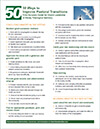Pastors moving from one church to the next need to focus on how they can effectively conclude their ministry in the church they are leaving, paving the way for their successor, and on how they can get off to a good start in their next church.
CONCLUDING MINISTRY IN ONE SETTING
Maintain good successor relations
- Work with the congregation to prepare the way for your successor.
- Work with your successor to provide good information about the congregation.
- Spend significant time with your successor with an agreed-upon agenda.
- Talk about your successor only in positive terms.
- Avoid making comparisons between yourself and your successor.
Approach the move with a generous and graceful spirit
- Share ownership for the move, and avoid blaming others.
- Avoid making inappropriate use of closure to address unresolved problems.
- Be gracious to everyone, especially those with whom you have had difficulty.
Provide good records and administrative wrap-up
- Prepare essential lists for your successor, and be sure important files are up to date.
- Make sure church bills are paid through the month you leave.
- Ensure that denominational giving is up to date.
- Never leave any unpaid personal bills in the community.
- Do not take church records with you.
Plan for appropriate goodbyes, grief, and closure rituals
- Provide adequate rituals to mark your leaving and the coming of your successor.
- Find appropriate ways to say goodbye and grieve with the congregation.
- Encourage loved ones to grieve the transition, and grieve with them.
- Grant and ask for forgiveness where needed, and tell the people you love them.
- Arrange personal visits and write personal notes where appropriate.
Clarify your new relationship with the church
- Clarify in spoken and written communication your new relationship with the people.
- Be clear that you will not be returning for pastoral roles.
- Take time to teach the congregation about closure and boundaries.
- Affirm love and friendship while releasing persons from pastoral relationships.
Keep working
- Continue vital ministry, avoid emotional withdrawal, and do not initiate major new programs in the closing months.
- Settle as many hanging difficulties as possible, including (and especially) staff difficulties.
- Leave the parsonage and office clean and in order.
BEGINNING MINISTRY IN A NEW SETTING
Learn about the new church and community
- Allow 6–18 months to get to know the people and community.
- Demonstrate willingness, and make the effort, to learn the history of the congregation.
- Learn the mission and vision of the congregation and their place in the life of the people.
- Study data (worship and financial statistics, community demographics, etc.) to understand the church and community.
- Make careful assessments of strengths, weaknesses, challenges, and opportunities.
Spend time with people and build relationships
- Make building relationships your highest priority, visiting as many people as you can.
- Visit people with pastoral needs and also those with key leadership responsibilities.
- Ask everyone you visit to suggest others with whom you should be talking.
- Meet with the pastoral relations/personnel committee early and regularly.
- Pay particular attention to pastoral care and preaching.
- Meet community leaders including other clergy. Be visible in the community.
- Develop a plan to get to know the people, communicate that plan, and stay faithful to it.
Be cautious about making immediate changes
- Do not change things at first, especially worship.
- Listen and observe with an open mind to discover strengths and needs.
- Earn the right to change things before initiating changes.
Build trust
- Express joy in being in your new ministry setting.
- Be authentic, honest, and genuine.
- Let people get to know you, and allow the congregation time to learn to trust you.
- Focus on the congregation and its future, not your agenda.
- If you introduce yourself in writing, have others read what you write to make sure you are not communicating unintended signals.
Honor your predecessor’s ministry
- Do not criticize the former pastor, even if criticism is warranted.
- Honor the progress and achievements accomplished before you arrived.
- Assure people it is all right to grieve the loss of their former pastor.
- Honor traditions long enough to understand the positive motivation behind them.
- Throughout it all, keep in mind: Avoid talking about your previous congregation. Do not complain, criticize, or make excessive demands. And be patient.
Download a PDF of this page to share with others.






